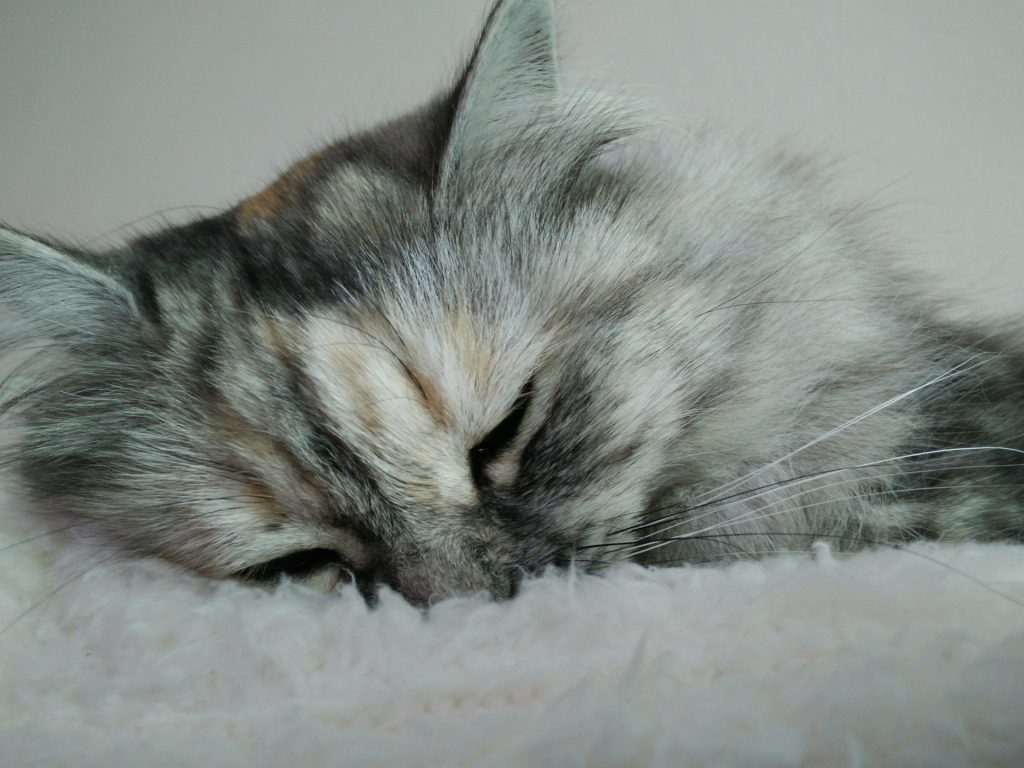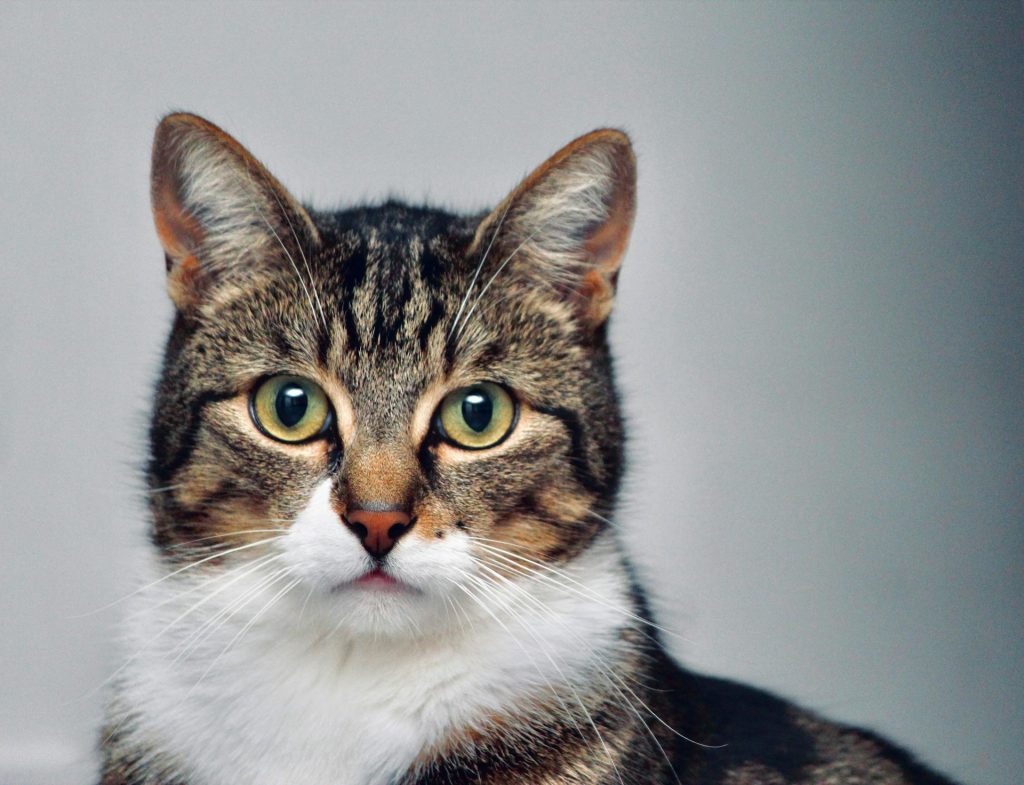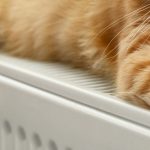Table of Contents
When the house falls silent, and darkness blankets the room, many cat owners find themselves pondering a nocturnal mystery: why does their feline friend meow at night? The answer lies in understanding the complex behaviors and needs of cats, which don’t always align with human sleep patterns. From nighttime antics that send them sprinting across the house to a series of vocalizations that can disrupt your rest, cats meow at night for various reasons. It’s a behavior that can leave owners in a state of curiosity and, occasionally, sleep-deprived frustration.
Older cats may be more prone to awake at night, with their meows echoing in the stillness, potentially signaling the need for attention or indicating a health issue. While the nighttime meowing of cats can be jarring, understanding the underlying causes is the first step toward a quieter, more harmonious night for you and your cat.
Unraveling the Mystery: Understanding Night-Time Meowing
As the lights dim, many cat owners notice their feline friend’s behavior shifts, transitioning into an active state that can last throughout the night. This active phase often includes cat meows at night, which can range from gentle mews to insistent yowls. These vocalizations can be a normal part of a cat’s nighttime routine, but they can also signal a need or distress. To address your cat’s nighttime antics effectively, it’s crucial to explore the reasons behind this behavior and consider the natural tendencies of these nocturnal creatures.
The Basics of Feline Nocturnal Activity
Although commonly believed to be nocturnal, cats are crepuscular by nature, meaning they are most active during dawn and dusk. This inborn rhythm could be the driving force behind their increased energy levels and vocalizations at night. If medical issues have been ruled out, the next step is to consider behavioral factors. Their innate crepuscular tendencies can lead to a spike in activity and vocalizations during these twilight hours.
Exploring the Natural Instincts of Cats at Night
Cats’ nocturnal behaviors are deeply rooted in their instincts. As descendants of predators that hunted at night, modern domestic cats retain some of those ancestral patterns. Their instinctual drive to explore and hunt can be heightened when the sun goes down, leading to increased activity and the potential for a cat yowling at night. This behavior is not just a bid for attention; it’s a manifestation of their innate need to engage in predatory behavior, which for indoor cats, can translate into nocturnal play and vocalization.
Decoding the Meows: Communication or Distress Signal?
Interpreting the meaning behind a cat’s meow at night can be challenging. While some meows may simply be a form of communication, others can indicate distress. Observing your cat’s body language and the context of their meows is essential in determining whether they are expressing contentment, seeking attention, or signaling that something is amiss. A cat’s nighttime vocalizations can be multifaceted, and understanding these nuances is key to addressing their needs.
Learning to Distinguish Between Types of Meows
Cats communicate several needs and desires through their meows, with each type carrying a distinct message. High-pitched meows may suggest your cat is greeting you or requesting something, while lower-pitched, more urgent-sounding meows could be a sign of discomfort or pain, potentially associated with conditions like kidney disease. By learning to recognize the differences in pitch, length, and frequency of your cat’s meows, you can better understand what they are trying to communicate, especially during the night when these sounds are more pronounced.

Top Reasons Why Your Cat May Be More Vocal at Night
Cats may become more vocal at night for several reasons, ranging from their instinct to be active at dusk and dawn, to health issues that manifest through increased vocalization. Understanding why your cat may be bored, hungry, or experiencing medical problems is crucial to addressing their night calling. A cat meowing at night can essentially be a way to express needs or discomforts that, if left unaddressed, may lead to a pattern of loud yowling. Offering active play before bedtime or a food puzzle can help mitigate attention-seeking behavior and provide the necessary mental and physical stimulation.
Senior Cats and Cognitive Dysfunction
As cats age, they may develop cognitive dysfunction, which can cause disorientation and increased vocalization, particularly at night. Senior cats might find navigating their environment more challenging, leading to confusion and distress that results in excessive meowing or yowling. Ensuring they have easy access to their litter box and other necessities can help reduce anxiety and the likelihood of nighttime vocalizations.
Identifying Age-Related Changes in Behavior
Noticing changes in the behavior of older cats can be indicative of age-related issues. They may become more vocal as they seek comfort or assistance navigating their environment. Adapting a cat’s environment to accommodate these changes, such as placing nightlights to help with visibility, can provide reassurance and help reduce disorientation and the resulting meows during the night.
Boredom and Lack of Stimulation
A lack of mental stimulation can lead to a bored cat, which may result in increased vocalizations during the night. Providing your cat with interactive toys and opportunities for play can help keep their mind engaged and reduce the chances of nocturnal meowing. Outdoor cats, in particular, may require additional stimulation to satisfy their instincts and avoid boredom-related behaviors.
Creating an Enriching Environment for Your Cat
Creating an environment to stimulate your cat’s senses and satisfy their curiosity is essential. Incorporating elements like scratching posts, climbing structures, and interactive toys can provide the mental stimulation and physical exercise necessary to keep your cat content and less likely to engage in nighttime vocalizations due to boredom.
Medical Concerns: From Hyperthyroidism to Hunger
Medical issues such as hyperthyroidism, which is more common in older cats, can lead to increased hunger and restlessness, often resulting in a cat meowing at night. Younger cats may also experience hunger pangs that disrupt sleep and prompt vocalizations. Addressing these concerns with appropriate veterinary care and dietary adjustments can help alleviate the symptoms and reduce nighttime meowing.
Recognizing Symptoms That Require a Vet Visit
Cats exhibit several symptoms that may warrant a visit to the vet. Changes in behavior, appetite, or sleep patterns, including increased meowing at night, can indicate an underlying health issue. It’s important to monitor your cat’s behavior and consult a veterinarian if you notice any concerning signs that could affect your cat’s brain or overall well-being.
The Plight of Outdoor Cats Feeling Confined
For an outdoor cat during the day, being kept indoors at night can lead to feelings of confinement and restlessness. Installing a cat flap can provide them with the freedom to explore outside at night, allowing them to expend energy and potentially reduce the occurrence of nighttime crying and vocalizations.
Mating Calls: Understanding Feline Reproductive Behaviors
Female cats in heat can produce loud and persistent mating calls that are especially prominent at night. These calls are a natural aspect of feline reproductive behavior and are used to attract males. Understanding this behavior is crucial for owners, as it can help them identify the reason behind their cat’s nighttime vocalizations and take appropriate measures, such as spaying or neutering, to mitigate the calls.
Practical Solutions to Minimize Night-Time Meowing
Cats’ nocturnal chirps and chatter can be charming but also sleep-disturbing. Addressing the root causes of night-time meowing involves implementing strategies that align with feline behavior and needs. By establishing routines and ensuring comfort, it’s possible to enjoy quieter nights without disrupting the instincts of these beloved pets.
Establishing a Soothing Nightly Routine
Consistency is key when setting a sleep schedule for your feline friend. A regular pattern of activities before bedtime signals to your cat that it’s time to settle down. This routine can include a fixed feeding time, followed by a calm period to digest, and a quiet cuddle session to foster a sense of security and readiness for sleep.
The Benefit of Playtime Before Bed
Incorporating playtime with cat toys in the evening can significantly reduce nocturnal meowing. Engaging your cat in stimulating activities tires them out physically and mentally, making them more likely to sleep through the night. Choose toys that mimic hunting behavior, like feather wands or laser pointers, to tap into their natural predatory instincts and ensure a satisfying play session.
Ensuring Accessibility to Food, Water, and a Clean Litter Box
Comfort and accessibility to basic needs can also impact a cat’s sleep. Ensuring your cat isn’t hungry or thirsty by providing an accessible and clean food and water station can prevent nighttime wakefulness. Moreover, a clean litter box is crucial as cats are fastidious creatures. A nightly cleanout may reduce the chances that your cat might be meowing at night due to an unclean environment.
The Art of Ignoring: When Not to Respond to Meows
If medical issues such as kidney disease are ruled out and your cat’s needs are met, it may be necessary to ignore the meowing. Responding to nighttime calls can reinforce the behavior, leading to a habitual cycle. Patience and consistency in not engaging with your cat during these episodes can eventually lead them to adapt to a quieter nighttime routine.
Checking for Disturbances in Your Cat’s Sleeping Area
Ensuring there are no disturbances in your cat’s sleeping area is another critical step. Once issues are ruled out, such as discomfort or environmental stressors, your cat may be more inclined to rest peacefully throughout the night. It’s important to provide a space that feels secure and familiar to your feline companion.
Creating a Safe and Quiet Environment
Creating a comfortable sleeping environment is essential for minimizing nighttime meows. This includes a cozy bed in a quiet, draft-free corner, away from the hustle and bustle of the household. Soft bedding and the absence of startling noises contribute to a serene atmosphere conducive to uninterrupted sleep for your furry friend.
Going Beyond the Basics: When to Seek Professional Help
When typical interventions fail, and your cat’s night-time meowing persists, it’s crucial to seek professional help. Persistent vocalization can indicate underlying health issues or distress. Veterinarians can provide medical evaluations, while behaviorists can offer insight into your feline companion’s unique behavioral patterns, ensuring your furry friend and you regain a restful night’s sleep.
Recognizing Persistent Issues and When It’s Time for a Vet
Senior cats may face thyroid issues or increased thirst that disrupt their sleep. If your cat’s nocturnal meowing is accompanied by other symptoms such as changes in appetite, water consumption, or litter box habits, it’s time to consult a vet. Early detection of health problems can lead to more effective management and improved well-being for your aging pet.
Consulting a Cat Behaviorist for Tailored Advice
When excessive vocalization persists, and your cat’s natural tendencies keep your cat awake, consulting a cat behaviorist can be beneficial. These professionals can assess your cat’s environment, daily routine, and interactions to identify potential behavioral issues. Tailored advice may then be provided to address the specific needs and habits of your cat, leading to more harmonious nights.

Putting an End to the Nocturnal Concert
Managing a cat’s nighttime vocalizations often requires addressing both medical issues and understanding that cats are crepuscular by nature. By recognizing and accommodating their natural activity patterns while also ensuring their health and environmental needs are met, it is possible to reduce the likelihood of disruptive meowing and enjoy a more peaceful night.
Tailoring Your Approach to Your Cat’s Unique Needs
Every cat is an individual, with its own set of preferences and requirements. Tailoring your approach to your cat’s unique needs, whether it involves adjusting their environment, providing additional stimulation, or seeking medical intervention, can help reduce nighttime meowing. Observing and responding to your cat’s specific behaviors will result in a more harmonious living situation for both pet and owner.
Maintaining Consistency for Long-Term Results
To achieve lasting success in quieting your cat’s nocturnal meowing, consistency is key. A stable sleep schedule is essential, and this can be fostered by adhering to a routine. Integrating consistent times for feeding and play can help signal to your cat when it’s time to settle down for the night. By routinely engaging in a bedtime ritual, your cat will learn to associate these activities with winding down, which can result in a quieter, more restful night for both of you.
Wrapping Up the Night-Time Serenade: Key Takeaways on Feline Meowing
Cat owners often find themselves puzzled by their cat’s nocturnal behaviors, including the perplexing habit of howling at night. Cats are naturally crepuscular animals, which means they are most active during the twilight hours of dawn and dusk. This can impact a cat’s internal body clock leading to nighttime activity. If your cat is crying at night, it could be a sign of discomfort or pain, and consulting with a cat behaviorist might provide insights tailored to your cat’s specific needs.
It’s important to consider that a cat’s body, much like ours, can be affected by various health issues. Senior cats, in particular, may experience changes in their sleep cycle, which can lead to increased vocalization at night. Blood tests can help determine if underlying conditions such as hyperthyroidism, kidney problems, or urinary tract infections are the root cause. Remember, giving your cat the right attention and care at the right time is crucial to ensuring peaceful nights for both of you.

Hi, I’m Zoey, a devoted mom to two charming Siamese cats. My passion lies in assisting fellow pet owners in providing optimal care for their cats. On CatsEuphoria, I share practical tips and relatable stories, inviting you to join me in appreciating the authentic bond between humans and our beloved feline companions.




